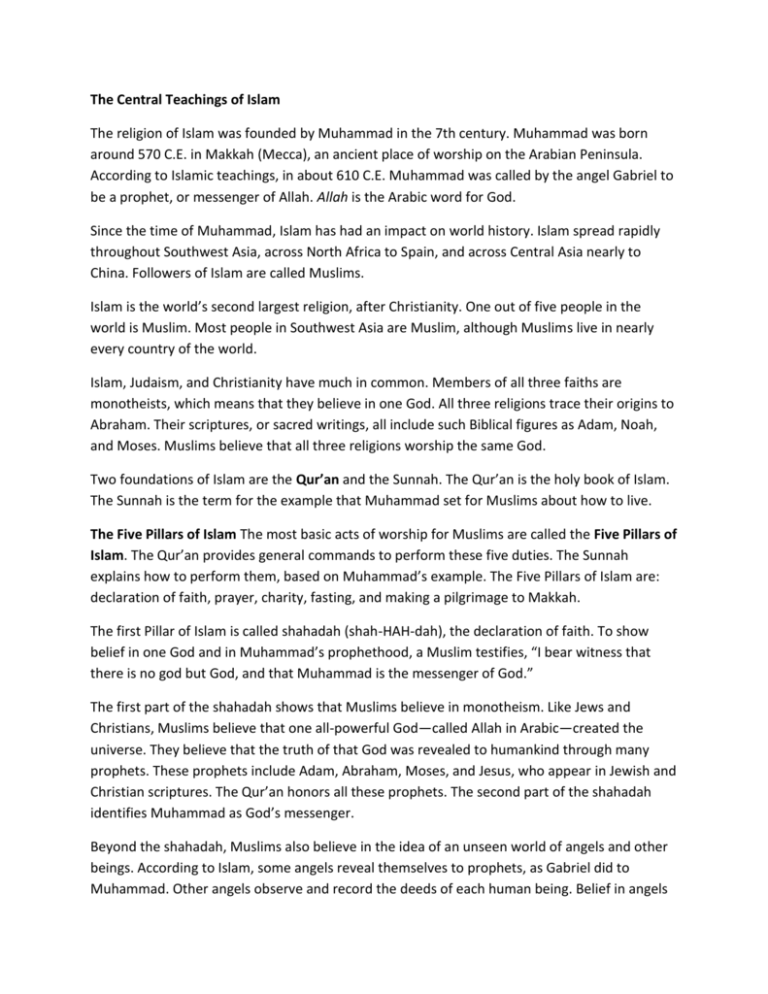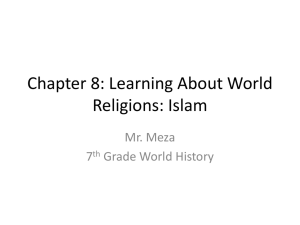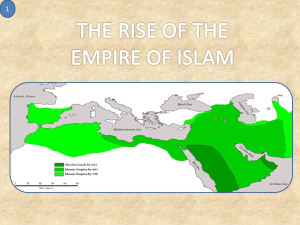File
advertisement

The Central Teachings of Islam The religion of Islam was founded by Muhammad in the 7th century. Muhammad was born around 570 C.E. in Makkah (Mecca), an ancient place of worship on the Arabian Peninsula. According to Islamic teachings, in about 610 C.E. Muhammad was called by the angel Gabriel to be a prophet, or messenger of Allah. Allah is the Arabic word for God. Since the time of Muhammad, Islam has had an impact on world history. Islam spread rapidly throughout Southwest Asia, across North Africa to Spain, and across Central Asia nearly to China. Followers of Islam are called Muslims. Islam is the world’s second largest religion, after Christianity. One out of five people in the world is Muslim. Most people in Southwest Asia are Muslim, although Muslims live in nearly every country of the world. Islam, Judaism, and Christianity have much in common. Members of all three faiths are monotheists, which means that they believe in one God. All three religions trace their origins to Abraham. Their scriptures, or sacred writings, all include such Biblical figures as Adam, Noah, and Moses. Muslims believe that all three religions worship the same God. Two foundations of Islam are the Qur’an and the Sunnah. The Qur’an is the holy book of Islam. The Sunnah is the term for the example that Muhammad set for Muslims about how to live. The Five Pillars of Islam The most basic acts of worship for Muslims are called the Five Pillars of Islam. The Qur’an provides general commands to perform these five duties. The Sunnah explains how to perform them, based on Muhammad’s example. The Five Pillars of Islam are: declaration of faith, prayer, charity, fasting, and making a pilgrimage to Makkah. The first Pillar of Islam is called shahadah (shah-HAH-dah), the declaration of faith. To show belief in one God and in Muhammad’s prophethood, a Muslim testifies, “I bear witness that there is no god but God, and that Muhammad is the messenger of God.” The first part of the shahadah shows that Muslims believe in monotheism. Like Jews and Christians, Muslims believe that one all-powerful God—called Allah in Arabic—created the universe. They believe that the truth of that God was revealed to humankind through many prophets. These prophets include Adam, Abraham, Moses, and Jesus, who appear in Jewish and Christian scriptures. The Qur’an honors all these prophets. The second part of the shahadah identifies Muhammad as God’s messenger. Beyond the shahadah, Muslims also believe in the idea of an unseen world of angels and other beings. According to Islam, some angels reveal themselves to prophets, as Gabriel did to Muhammad. Other angels observe and record the deeds of each human being. Belief in angels is found in Christianity and Judaism, as well as in Islam. Muslims also believe that all souls will face a day of judgment. On that day, God will weigh each person’s actions. Those who have lived according to God’s rules will be rewarded and allowed to enter paradise. Those who have disbelieved or done evil will be punished by falling into hell. The second Pillar of Islam is salat (SAH-laht), daily ritual prayer. Throughout Muslim communities in Southwest Asia, people are called to prayer five times a day: at dawn, noon, mid-afternoon, sunset, and after nightfall. The third Pillar of Islam is zakat, or charity. Muhammad told wealthy people to share their riches with the less fortunate. This practice remains a basic part of Islam. According to the teachings of Islam, Muslims must share about one-fortieth (2.5 percent) of their surplus wealth each year. Zakat is similar to charitable giving in other religions. For instance, Jews and Christians also ask for donations, called tithes (TYTHZ), to support their houses of worship and charitable activities. The fourth Pillar of Islam is siyam (see-YAM), or fasting (going without food). The Qur’an instructs Muslims to fast for an entire month during Ramadan, the ninth month of the Islamic calendar. According to Islamic teachings, Ramadan was the month when God first revealed his message to Muhammad. During Ramadan, most Muslims fast from daybreak to sunset. However, pregnant women, travelers, the sick, the elderly, and young children do not have to fast. The fifth Pillar of Islam is hajj (HAJZH), the pilgrimage to the holy city of Makkah. In the twelfth month of the Islamic year, millions of believers from Southwest Asia and all over the world travel to Makkah. All adult Muslims who are able to make the journey are expected to perform the hajj at least once during their lifetime. In Makkah, pilgrims follow what Muslims believe are the footsteps of Abraham and Muhammad. For five days, they dress in simple white clothing and perform a series of rituals, moving from one sacred site to another. One such ritual takes place at the Great Mosque, which houses the Ka’bah, a large cube-shaped building made of granite. Muslims believe that Abraham built the Ka’bah as a shrine to honor God. The pilgrims circle the Ka’bah seven times, which is a ritual mentioned in the Qur’an. Traditional Muslim Practices The Five Pillars set the rhythm of life for practicing Muslims and Islamic societies. These are known through the Qur’an and Sunnah. Sunnah means “practice” in Arabic. It refers to the example that Muhammad set for Muslims during his lifetime. The Qur’an often provides only general commands. The Sunnah explains how to perform these commands, based on Muhammad’s example. What Muhammad did or said in a certain situation has set a precedent, or guide, for all Muslims. For instance, Muhammad told his followers to make sure that their guests never left the table hungry, underscoring the importance of hospitality. He also reminded children to honor their parents, especially mothers. Muhammad commanded believers to have mercy on all living things, including animals, so that God would have mercy on them. Many Muslim teachings, known through the Qur’an and Sunnah, parallel teachings in Judaism and Christianity. Like Jews and Christians, Muslims are supposed to be kind to neighbors, work for justice, and forgive the wrongs of others. All people, according to Islam, are God’s creation and equal in God’s eyes. Muslim Places of Worship Muslim places of worship are called mosques. Praying at a mosque is preferable, although Muslims may worship anywhere. The main room in a mosque, where Muslims worship, has little or no furniture. Everyone sits on the floor to show their equality of status. A niche in one of the walls shows the direction of Makkah. All worshippers face Makkah during their prayers. On Fridays, Muslims gather at a mosque to pray. Women sit apart from the men. Although Muslims set Fridays aside as a special day of prayer, they do not observe Fridays as a Sabbath, or day of rest. Friday is the day of the weekly grand prayer, but Muslims may also gather for prayers during the times of the five daily prayers. Muslim Holidays The two major Muslim holidays are Eid al-Fitr (eed AL-fitter) and Eid al-Adha (eed ALadh’hah). Eid al-Fitr takes place when Ramadan ends. People attend prayers at a mosque. They wear new clothes, decorate their homes, and prepare special foods. They visit friends and family and exchange gifts. Eid al-Adha is a festival at the end of the hajj in Makkah that also is celebrated by Muslims all over Southeast Asia and the world. In honor of Abraham, some Muslims families sacrifice animals, usually sheep or goats, and share the meat with family, friends, and the poor. The festival lasts for four days, during which Muslims visit friends and family and exchange gifts.








